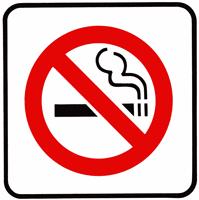Program helps deployed Soldiers nix the butts
By Karen Fleming-Michael
CAMP STRIKER, Iraq (Army News Service, July 17, 2006) – Quitting smoking was the last thing Master Sgt. David Dulen expected to do when he deployed to Iraq last September.
The pack-a-day smoker for more than 20 years had considered quitting many times, but his “smoke ’em if you got ’em” habit endured. Then his wife quit last year.

“I kind of had an incentive then, or maybe it was just a challenge from my wife,” he wrote in an e-mail from Camp Striker, near Baghdad. “The opportunity to quit while deployed to Iraq never crossed my mind; in fact, I told my wife that I would have to wait until after the deployment to quit and come online with a smoke-free life.”
Long periods of downtime between missions and cigarettes being readily available – and at times even cheaper than in the United States – pose an obstacle to anyone wanting to quit while deployed, said Capt. Amy Jackson, a physician assistant at Camp Striker.
However, a few Soldiers in the camp of 4,500 troops paved the way for Dulen’s road to being smoke-free when they approached Jackson to ask if a smoking-cessation program was available. There wasn’t, so she started one.
“These guys were asking for something that I’m supposed to offer them as a provider,” she said. “I thought it was awesome that they asked.”
In designing the four-week program, Jackson used every possible tactic to help quitters quit. Soldiers can receive nicotine patches, gum and prescription drugs to help them stave off the symptoms of nicotine withdrawal. They attend classes on the health benefits of quitting, stress management and relaxation. They also have Jackson and her medics to turn to for suggestions on how to cope when the cravings come.
“I encourage them to drink more water, play games on their smoke break, take a walk around their work area, exercise, read their smoking-aid handbook, put a toothpick in their mouth after chow instead of lighting up or take up a new hobby – anything to take their mind off their addiction,” she said.
Word of the program quickly spread. So far 53 smokers have joined the program. Sixteen smokers who used tobacco for a total of 203 years quit for good; eight of them had smoked for more than 10 years.
Dulen quit Dec. 6. He expected to have withdrawal symptoms – and he did – so he sucked on hard candy and chewed a lot of gum. He also used the prescription aids.
“I used the patches and the pills religiously, though I don’t think that I needed them for the entire timeline that Captain Jackson had us on them, but I wanted to stay with whatever the program said to do,” he said.
Twenty-six Soldiers didn’t stick with the program, often bailing at the two- or three-month mark. Jackson thinks they’ll quit eventually.
“When I started the program, many of my peers recommended that I not be discouraged if I didn’t see any success given our environment, mission and stress level,” she said. “I am very pleased with the outcome and am still hopeful for those who attended the course, knowing that the seed has been planted and they may always try again to quit.”
Relapses are to be expected, and Dulen’s had just two cigarettes since quitting six months ago.
“I didn’t even smoke the whole thing,” he said. “I didn’t like the way it tasted or the affect it was having on my chest.”
Jackson plans to follow up with her quitters after they return to the United States to see how they’re managing during a time when they may be tempted to smoke.
“Getting back into the ‘old routine’ may include smoking in the car that they used to smoke in before they deployed. There will be some nights out on the town, and alcohol and tobacco go hand in hand,” she said. “If their spouse smokes, it will be difficult to avoid the temptation, but a support system may get them past the adjustment period to avoid slipping into old habits.”
Jackson’s work has made a real difference, said Maj. Edward McDaniel, a doctor at Camp Striker.
“Many Soldiers have come to me saying that she has given them a new start on life,” he said. “These Soldiers want to return home to their families happier and healthier. No doubt, this is a huge challenge, but many are up to the task.”
Dulen said he’s through with cigarettes.
“I no longer have the desire to smoke,” he said. “I have my days when I think I am a little stressed and say, ‘Boy, I could use a cigarette.’ But I don’t smoke, so I believe that I will be smoke-free the remainder of my life.”
(Editor’s note: Karen Fleming-Michael writes for the U.S. Army Medical Research and Materiel Command.)